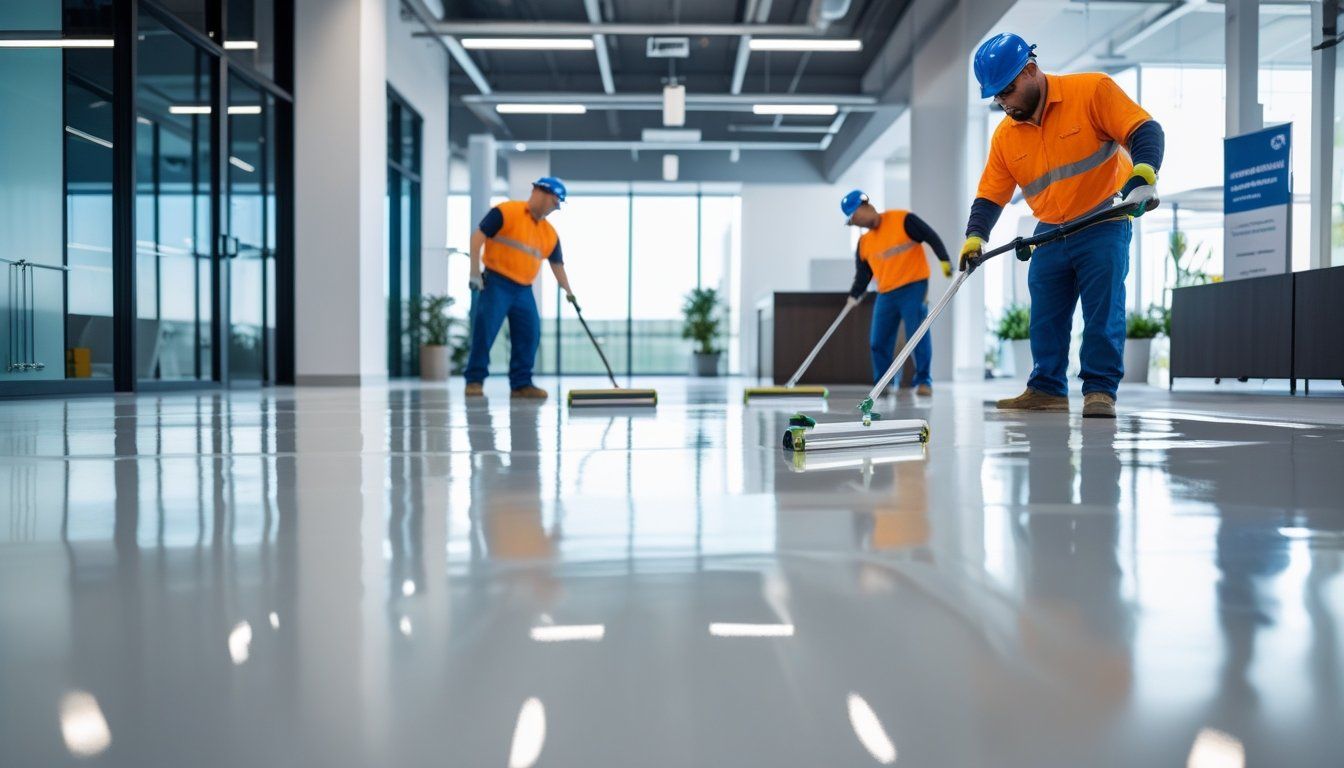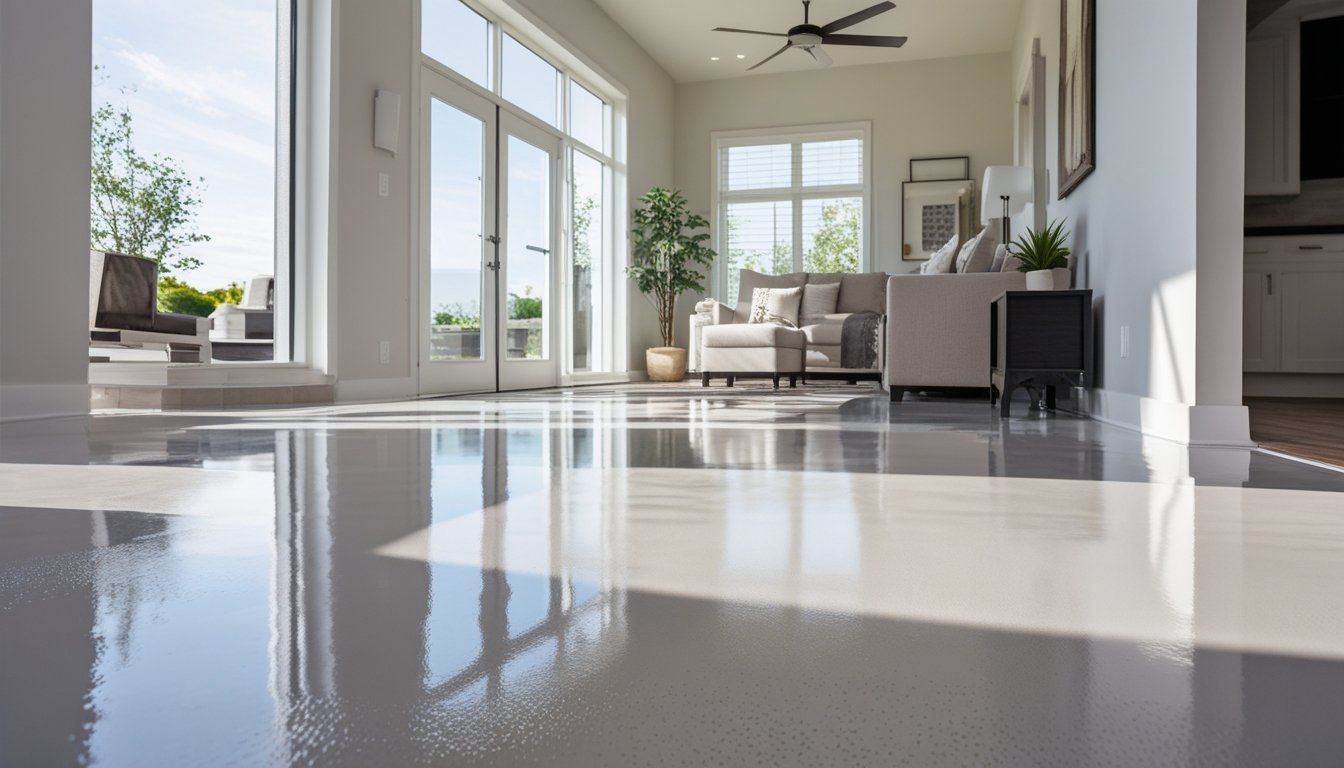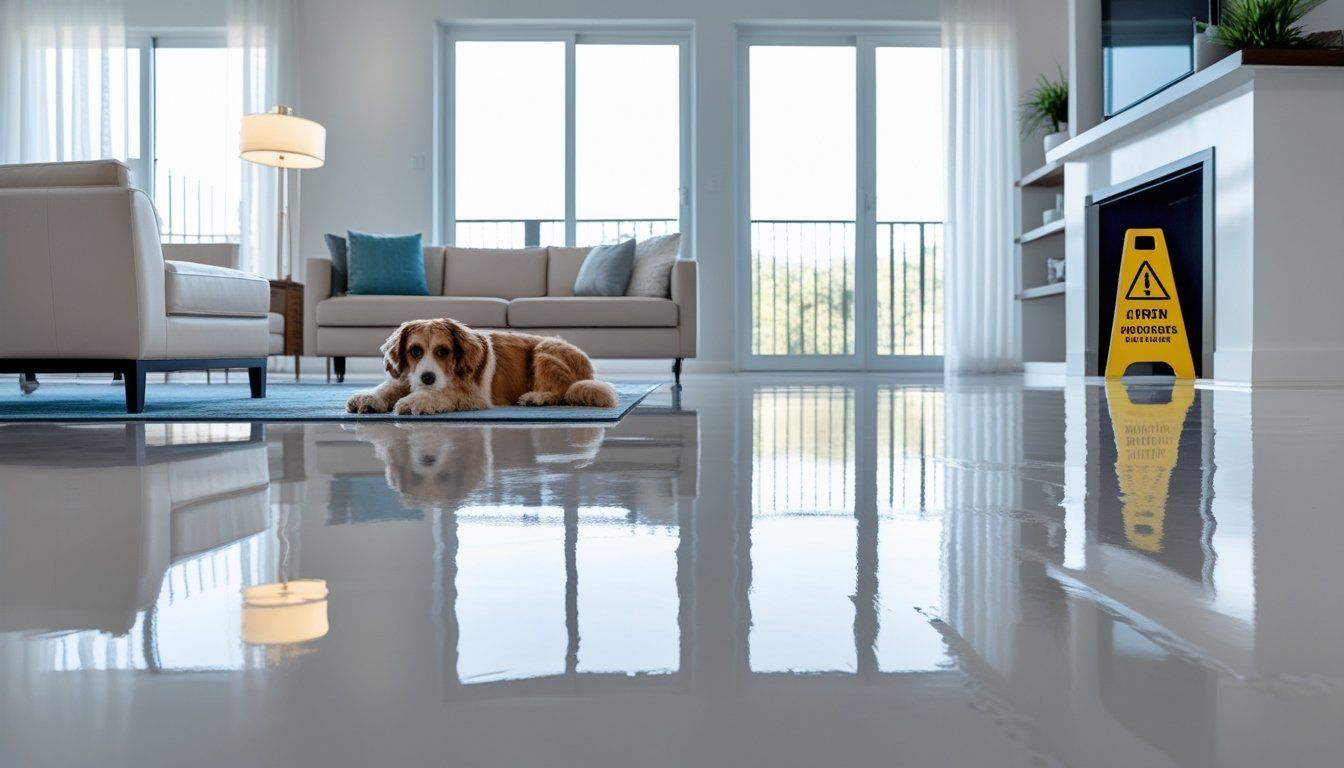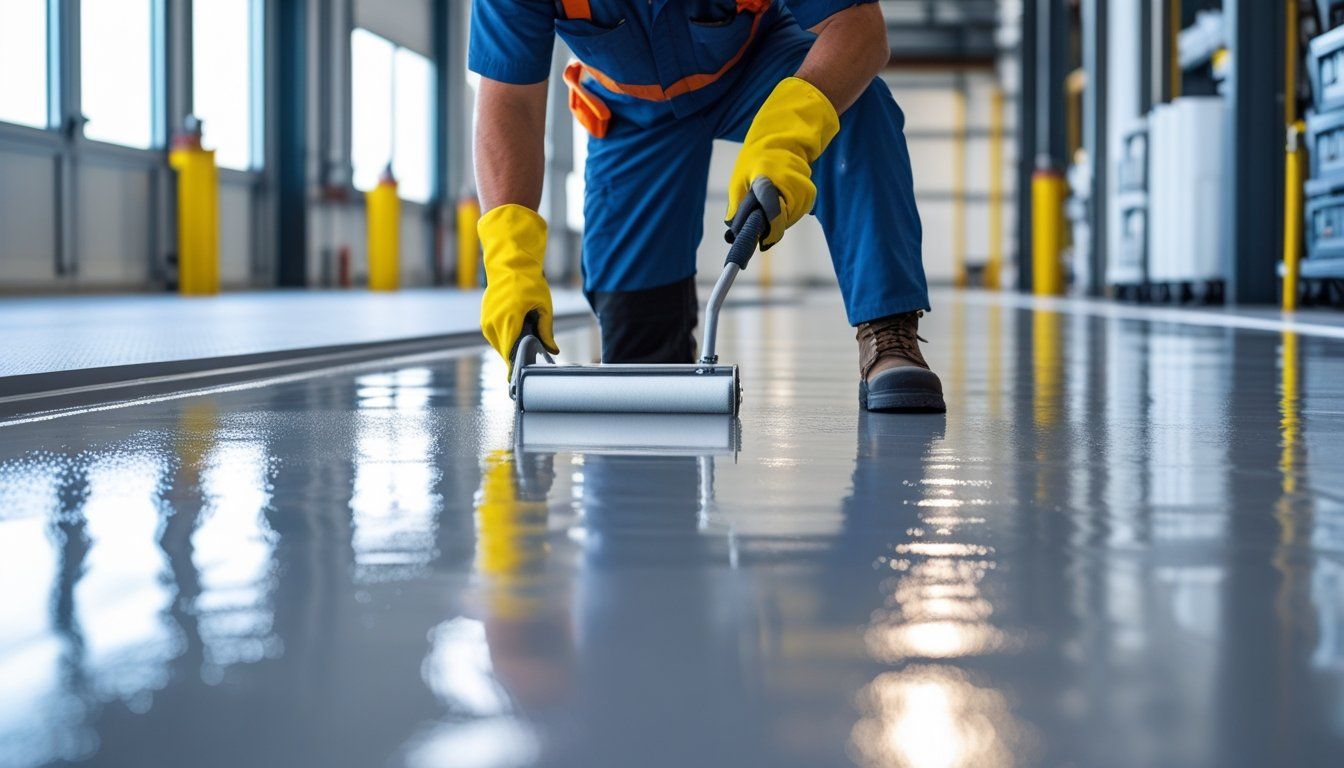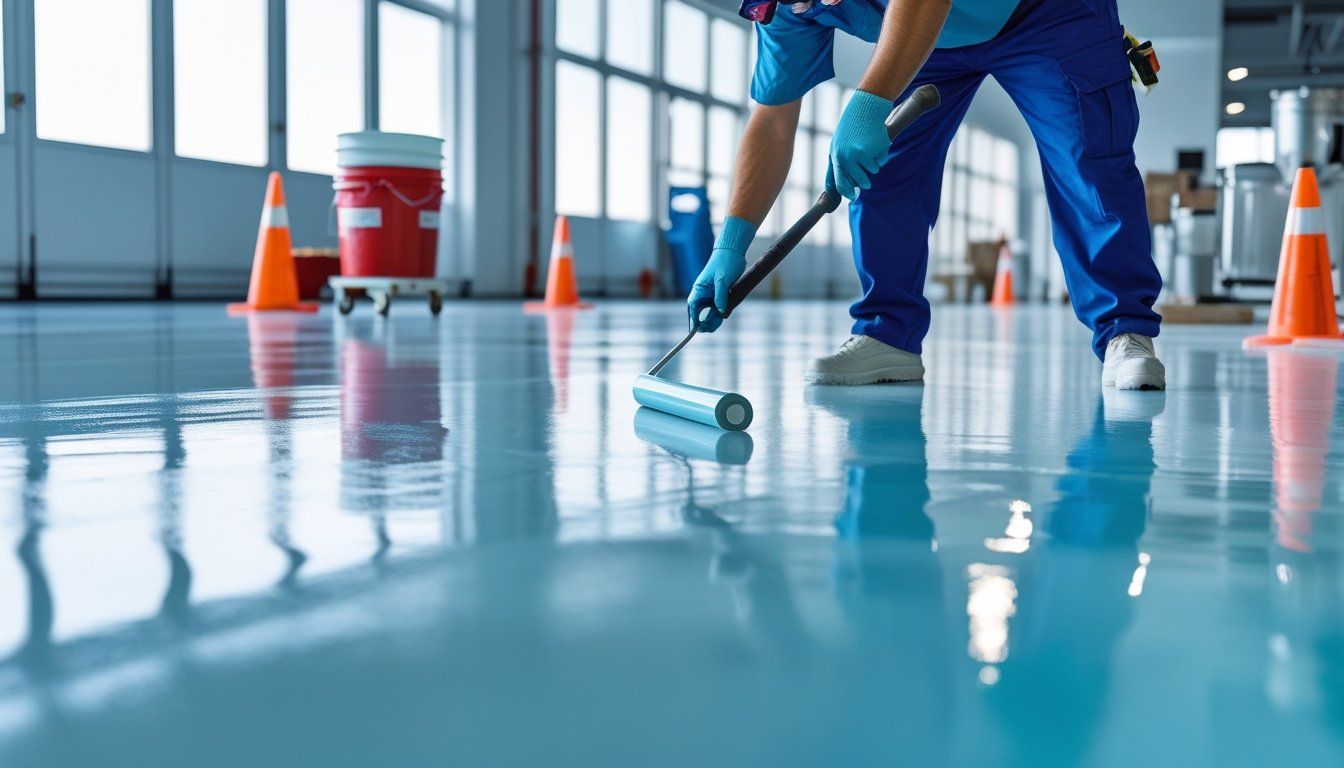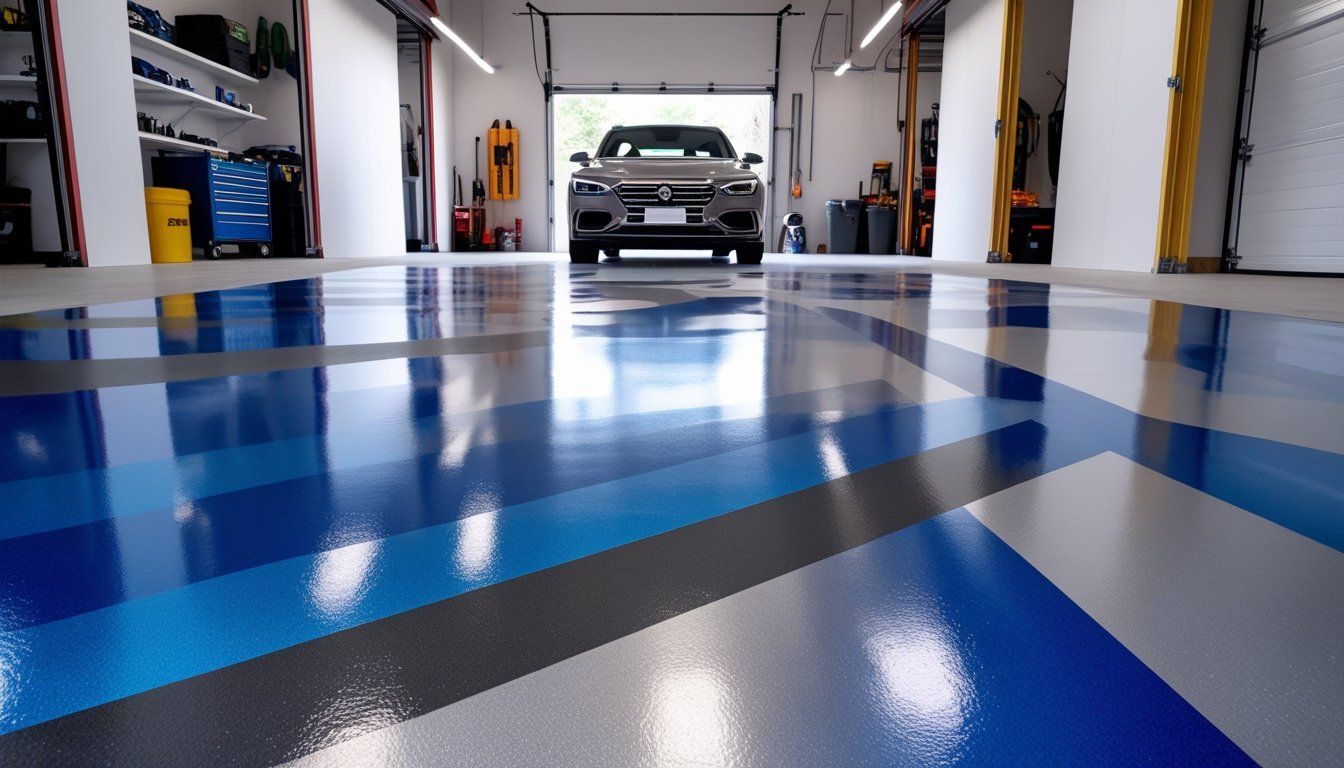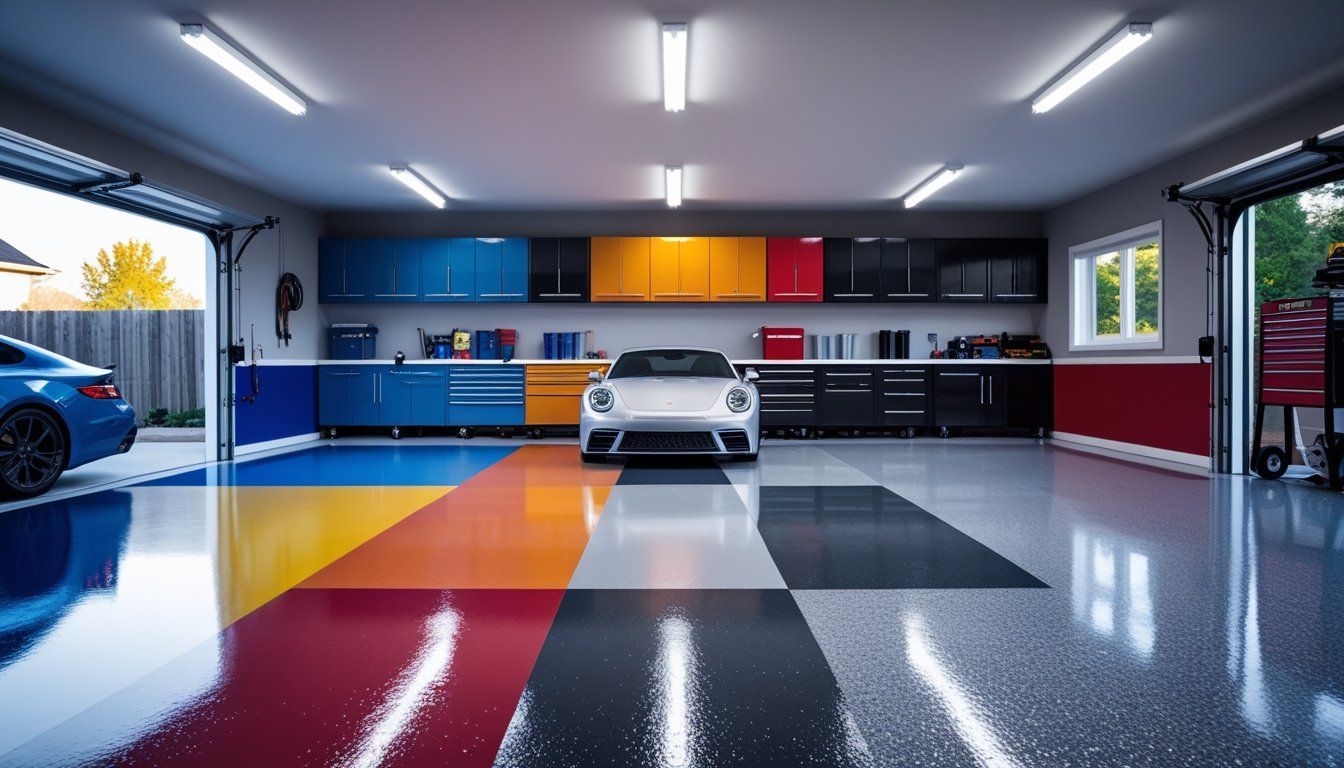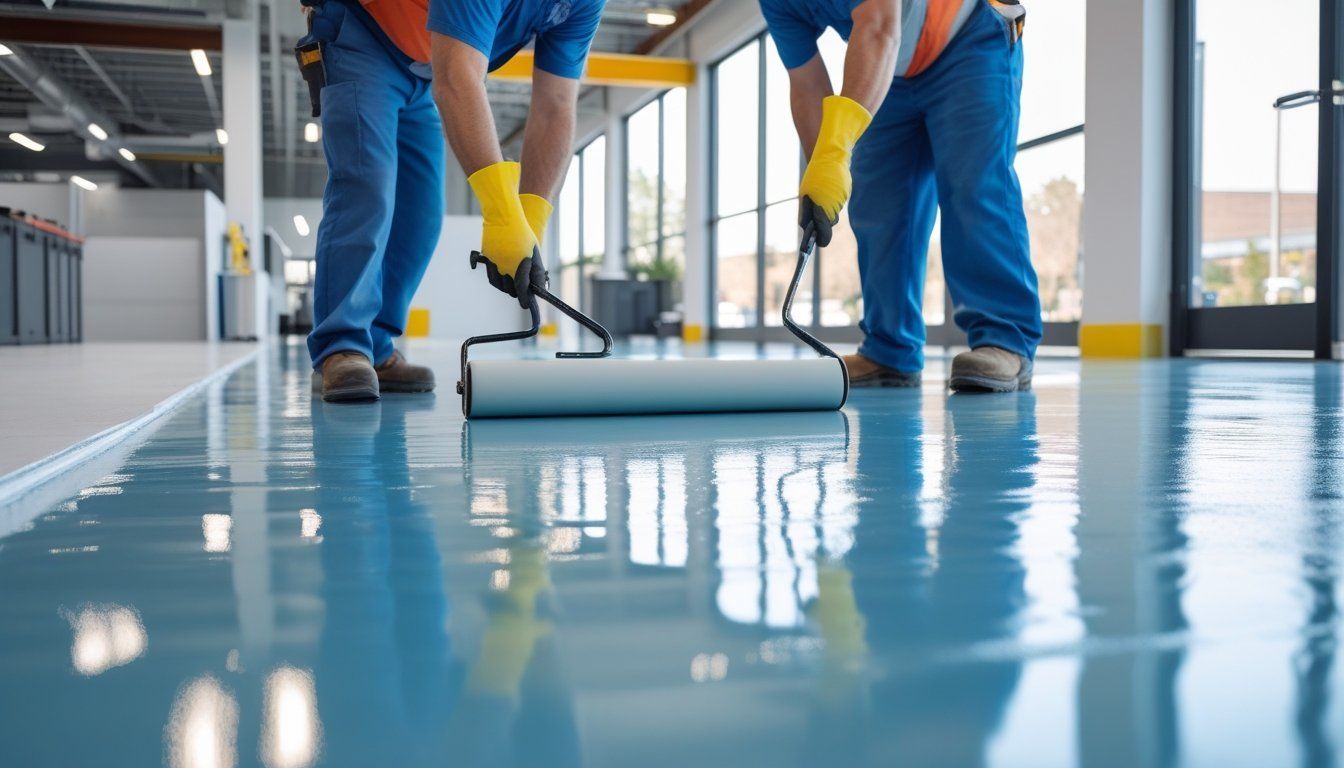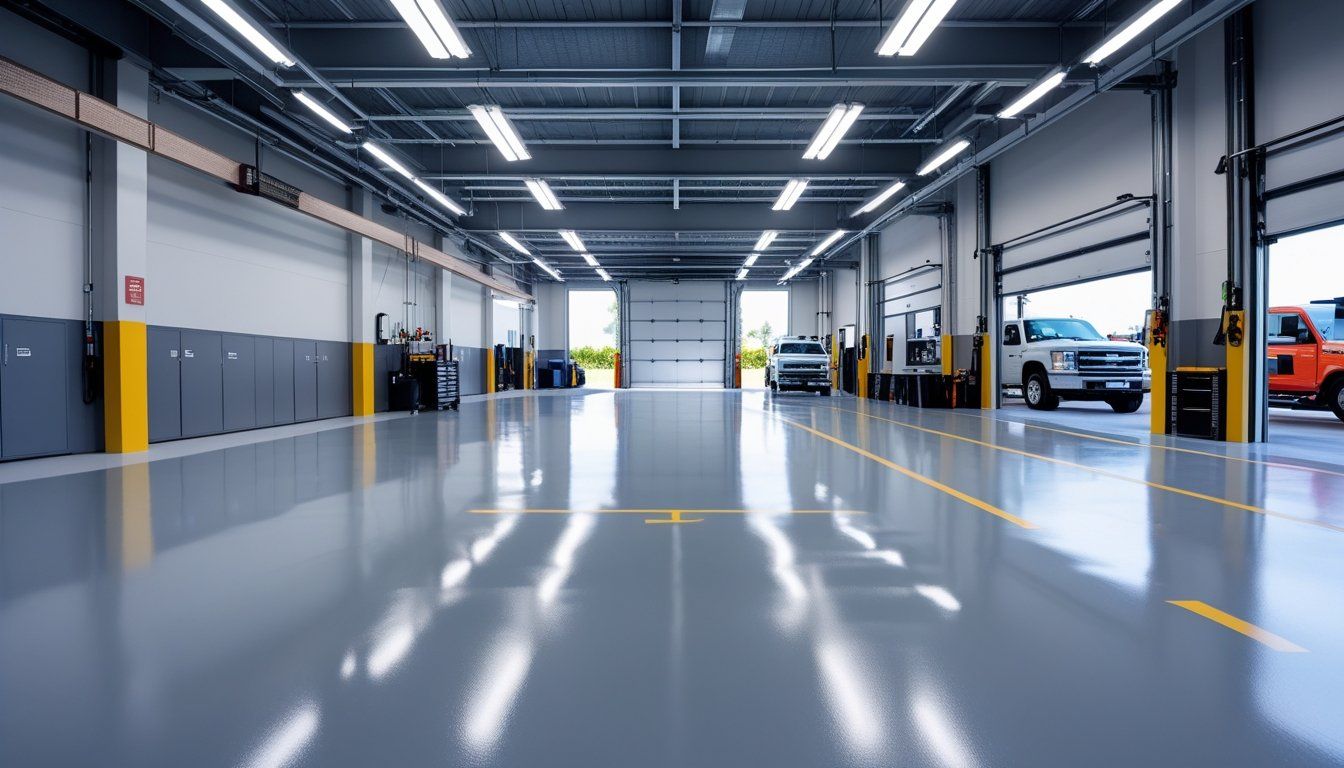Pros and Cons of Epoxy Flooring Explained for Your Home or Garage
Daniel McGonagle • October 3, 2025
Epoxy flooring has become a popular option for homeowners and business owners who want floors that last, look great, and are easy to maintain. Known for its shine, strength, and design flexibility, epoxy flooring delivers dependable performance in garages, basements, and commercial spaces alike.
At Cambridge MA Epoxy Flooring, we help clients
throughout Greater Boston choose the right epoxy finish for their homes and businesses.
Our local experience ensures your floors can handle New England’s changing seasons while keeping their durability and appearance.
In this article, you’ll learn the key advantages and drawbacks of epoxy flooring. We’ll explain where epoxy performs best, when it may not be ideal, and how to decide if it’s the right investment for your space.
What Is Epoxy Flooring
Epoxy flooring is a tough coating made by mixing two parts: epoxy resin and a hardener. This mix creates a strong, plastic-like layer that sticks tightly to concrete floors.
It makes your floor more durable, easier to clean, and gives it a shiny, smooth finish. You can choose from many colors and textures to match your style. It also handles heavy use well, making it a good choice for homes, businesses, and industrial spaces.
Popular Uses for Epoxy Flooring
Epoxy flooring works great in many places because it lasts a long time and looks good. You might use it in your garage to cover cracked concrete or in your basement to brighten the space.
Businesses like offices, gyms, or restaurants use epoxy floors because they are easy to clean and resist stains. For industrial settings like warehouses or factories, epoxy floors protect the surface from heavy machines and chemical spills.
Local companies can help you pick the right style and finish for your needs, whether it's anti-slip, decorative, or just plain tough.
Epoxy Flooring Installation Process
Installing epoxy flooring starts by cleaning and repairing your concrete floor. Any cracks, stains, or dust must be removed so the epoxy sticks well.
Next, the epoxy resin and hardener are mixed and spread evenly on the concrete. The installer uses rollers or brushes to cover the floor with one or more layers.
Each layer needs time to dry before adding the next. A good installation
usually takes a few days from prep to finish. Professional installers make sure the floor is smooth, durable, and ready for use in about a week.
Advantages of Epoxy Flooring
Epoxy flooring offers several clear benefits that make it a popular choice for many homes and businesses. It stands out for its toughness, ease of care, and ability to improve the look of your space.
Durability and Longevity
Epoxy floors are known for their strong resistance to damage. They handle heavy foot traffic, machinery, and even impacts without cracking or peeling.
If you have a garage or warehouse in Cambridge, an epoxy floor can last for many years while keeping its quality. This toughness comes from the chemical bond between the epoxy resin and concrete, creating a hard surface.
It also protects your floor from stains and chemicals, which means spills won’t leave permanent marks.
Easy Maintenance
One of the best things about epoxy flooring is how simple it is to clean. Because the surface is smooth and sealed, dirt and dust don’t stick easily. A quick mop or sweep is usually enough to keep your floors looking good.
Epoxy doesn’t absorb liquids, so spills like oil or wine won’t stain your floor. You won’t need harsh chemicals to remove dirt either, saving you time and money on cleaning supplies.
Attractive Appearance
Epoxy floors can completely change how your space looks. You have many design choices, including colors, patterns, and finishes like glossy or matte. Decorative flakes or metallic effects add style and make your floor stand out.
This flexibility allows you to match your floor to your personal taste or your brand’s look in commercial settings. Whether it’s a vibrant garage in Somerville or a sleek showroom in Boston, epoxy flooring can help create a polished and welcoming environment.
Epoxy Flooring Disadvantages
Epoxy flooring has
some downsides you should think about before choosing it. These include how it handles damage, safety risks when wet, and how it reacts to sunlight.
Susceptibility to Cracking
Epoxy floors are tough but can crack over time if the surface beneath them shifts or has existing damage. Concrete that expands, contracts, or settles unevenly can cause the epoxy to crack or peel.
This is especially true in places with cold winters and hot summers, like Cambridge, MA. Small hairline cracks might not look bad but can grow if not fixed quickly.
Cracks also allow moisture to reach underneath, which weakens the bond and lowers durability. Choosing professional installers helps reduce this risk because they prepare the floor properly before applying epoxy.
Slippery When Wet
Epoxy floors have a smooth, shiny finish by nature. This look is popular, but it can make floors slippery when they get wet.
If you plan to use epoxy in garages, basements, or entryways where water or spills are common, you need to take extra care with safety. Luckily, you can choose anti-slip epoxy coatings or add textures like flakes or grit.
These options keep your floors safe without losing the style and shine you want. If you have kids, pets, or slippery work areas, ask your installer about anti-slip solutions to help avoid accidents.
Sensitivity to UV Light
Epoxy flooring is sensitive to ultraviolet (UV) light from the sun. When exposed for long periods, it can yellow, fade, or become brittle.
This usually shows up on floors near windows or in sunrooms. If your space gets a lot of sunlight, protect the epoxy with UV-resistant topcoats or consider choosing decorative finishes designed to handle light.
This is important for outdoor patios or rooms with large glass areas. Our team can help you select the best options to keep your floors looking fresh longer.
Health & Safety Risks During Installation
During installation, epoxy primers, resins, and hardeners can emit volatile organic compounds (VOCs) and irritants. Proper ventilation and PPE are essential to protect the installer and occupants.
According to OSHA, uncured epoxy resins
may cause skin irritation, allergic sensitization, or respiratory discomfort. Always use low-VOC or zero-VOC formulations when possible, and restrict access to the area until full curing is confirmed.
Cost Considerations
Epoxy flooring costs can vary depending on the size of your space and the type of finish you choose. You should think about both the upfront installation price and how much value you’ll get over time.
Initial Installation Costs
The cost to install epoxy flooring usually ranges from $3 to $12 per square foot. This price depends on factors like floor condition, design complexity, and required prep work. If your concrete has cracks or stains, fixing those will add to the price.
Choosing extra features like anti-slip coatings or metallic finishes raises costs but can improve safety and style. Labor also affects the total; professional installation ensures the flooring lasts longer and looks good. Always look for clear estimates so you know what to expect before work begins.
Long-Term Value
Epoxy floors are durable, needing less repair over time than other floor types. This means you’ll save money on maintenance and cleaning in the long run.
The smooth, sealed surface resists stains, spills, and heavy use, helping your space stay attractive for years. You’ll also benefit from easy maintenance.
A simple mop and occasional re-coat keep the floor looking fresh, which saves money and effort.
Suitability for Different Environments
Epoxy flooring works well in many places but performs differently depending on the space and how it is used. Knowing where epoxy floors do best helps you choose the right option for your needs.
Residential Applications
Epoxy flooring is great for garages and basements. It protects your floor from stains, cracks, and daily wear. Its smooth, glossy finish makes cleaning spills and dirt easy, a big help if you have kids or pets. You can also customize colors and patterns to match your home style.
However, epoxy floors do not handle extreme temperature changes well. If your space is not climate-controlled or faces hot summers and cold winters, cracks or peeling may happen.
For patios or outdoor areas in Cambridge and surrounding towns, consider weather-resistant options and professional guidance to find the best solution for your home.
Commercial and Industrial Spaces
In commercial or industrial areas, epoxy flooring shines because of its durability and resistance. It can handle heavy foot traffic, machinery, and common spills like oils or chemicals without damage.
This makes it ideal for offices, gyms, retail stores, warehouses, and factories. Epoxy’s chemical resistance and easy cleanup lower downtime and maintenance costs, keeping your business running smoothly.
Anti-slip coatings add safety, protecting employees and customers. For industrial use, our team offers floors that meet safety rules and stand up to tough conditions, especially in Greater Boston facilities.
Maintenance and Care Tips
Taking good care of your epoxy floors helps keep them looking great and lasting longer. Simple cleaning routines and quick repairs make a big difference in protecting your investment.
Routine Cleaning
To keep your epoxy flooring clean, sweep or vacuum regularly to remove dust and dirt. Use a soft broom or dust mop to avoid scratching the surface.
For deeper cleaning, use a mild detergent mixed with warm water and a soft mop or cloth. Avoid harsh cleaners, acidic products, or abrasive scrubbers, as they can damage the finish.
Rinse the floor well with clean water after washing to remove any soap residue. Use mats at entry points to catch dirt and reduce wear.
If you have a commercial space, it’s especially important to clean spills quickly to prevent stains or slips. Routine care keeps your floor durable, safe, and attractive for years.
Repairs and Touch-Ups
Small scratches or chips can happen, but addressing them quickly keeps your floor in good shape. For minor damage, you can use repair kits designed for epoxy floors, which usually include resin and hardener to fill in cracks or gouges.
If the floor starts to lose its shine or shows spots where the coating is worn, consider a light sanding before applying a fresh epoxy topcoat. This resealing restores protection and improves appearance.
For larger damage or frequent issues, contact local epoxy flooring experts for repair support. Professional repairs ensure your floor stays long-lasting and maintains its strength, especially in busy homes or commercial areas.
Comparing Epoxy Flooring to Other Flooring Options
Choosing flooring means
balancing durability, style, and maintenance. Epoxy stands out because it offers strong protection and easy care, but you might wonder how it compares to other common floors like concrete and tile.
Epoxy vs. Concrete
Concrete is a basic and cost-effective floor choice. It’s strong but can crack, stain, and look dull over time.
Without a finish, concrete can trap dust and be hard to clean. Epoxy transforms concrete by adding a tough, glossy layer that resists stains, chemicals, and impact. It also seals cracks and prevents dust.
This makes your floor easier to maintain and improves safety with anti-slip options. If you want to update cracked or old concrete, epoxy is a smart choice. It costs more upfront but lasts longer and looks better.
For local expertise, our professionals specialize in upgrading concrete floors with durable epoxy coatings that fit different spaces.
Epoxy vs. Tile
Tile floors offer many colors and designs, and they handle water well. But the grout between tiles gets dirty and may crack or pop loose over time. Tiles can also chip if heavy objects fall on them. Epoxy provides a smooth, seamless surface without grout lines.
This means less cleaning and no gaps for dirt or water. It also resists impacts and chemicals better than most tiles.
Tile may feel colder and harder underfoot than epoxy, which can be customized with softer textures. Epoxy flooring works well in busy areas like garages or basements where spills or wear are common.
If you want a floor that’s easier to clean and lasts through heavy use, epoxy is a good option. A trusted professional can help you choose a finish that matches your style while keeping maintenance simple.
Environmental and Health Impact
Epoxy flooring offers strong, low-maintenance surfaces, but it’s important to understand its environmental and health aspects. Some compounds in epoxy can affect air quality, and the ability to recycle epoxy materials is limited.
VOC Emissions
Volatile Organic Compounds (VOCs) are chemicals released during epoxy flooring installation. These VOCs can cause short-term health issues like headaches, dizziness, or throat irritation if the area isn’t well ventilated.
Proper installation by experts helps reduce these risks by using low-VOC or no-VOC products and ensuring good airflow. VOCs also contribute to air pollution, affecting the environment around your property.
Choosing epoxy coatings with lower VOC levels supports cleaner indoor air and less outdoor pollution. It’s important to give floors enough time to cure before using the space to keep you and your family or employees safe.
Recyclability
Epoxy resins are not biodegradable and are tough to recycle due to their chemical makeup. Once applied, epoxy flooring often stays in place for many years because it is so durable. When it’s time to remove or replace epoxy floors, disposal can pose environmental challenges.
It usually requires special handling to prevent harmful chemicals from entering landfills. Local epoxy flooring professionals can guide you through eco-friendly options and proper disposal methods to reduce your flooring’s environmental footprint.
Making the Right Flooring Choice for Your Space
Epoxy flooring offers a strong balance of beauty, performance, and longevity. From garages to industrial facilities, it provides a clean, durable surface that resists stains, impacts, and wear. Understanding the pros and cons helps you choose and make the most of your investment.
Cambridge MA Epoxy Flooring brings local knowledge and precision installation to every project.
Our team helps homeowners and business owners find epoxy solutions that match their needs and hold up to Greater Boston’s climate and daily use.
Ready to explore your options?
Contact us today
for a free quote and personalized consultation. Discover how the right epoxy floor can protect and transform your space.
Frequently Asked Questions
Epoxy flooring offers many benefits but also comes with some limits. Knowing the details about cost, durability, and where it works best will help you decide if epoxy floors fit your needs.
What are some advantages of using epoxy flooring in residential areas?
Epoxy floors are easy to clean and resist stains, making them great for garages, basements, and patios. They add a polished look to your home and handle spills and heavy foot traffic well.
How cost-effective is epoxy flooring compared to other flooring options?
Epoxy flooring is usually less expensive over time because it lasts long and needs little upkeep. You avoid frequent repairs or replacement, which saves money compared to wood or tile floors.
What are some common issues one might encounter with epoxy flooring?
The surface can get slippery when wet unless treated with anti-slip additives. Also, cracks in the concrete underneath may show through if not fixed before installation.
Can epoxy flooring be used in areas with high moisture like bathrooms?
Epoxy can be used in moist areas, but it requires proper surface preparation and sometimes extra sealants. Poor installation can lead to peeling in high-humidity spots like bathrooms.
How durable is epoxy flooring over time?
Epoxy floors are very strong and resist wear from heavy use. With the right care, they can last many years without losing their shine or protection.
In what situations is epoxy flooring not recommended for use?
If the floor has major cracks or moisture problems, epoxy might not bond well. It’s also less suited for areas requiring soft or warm flooring, like bedrooms or living rooms.
